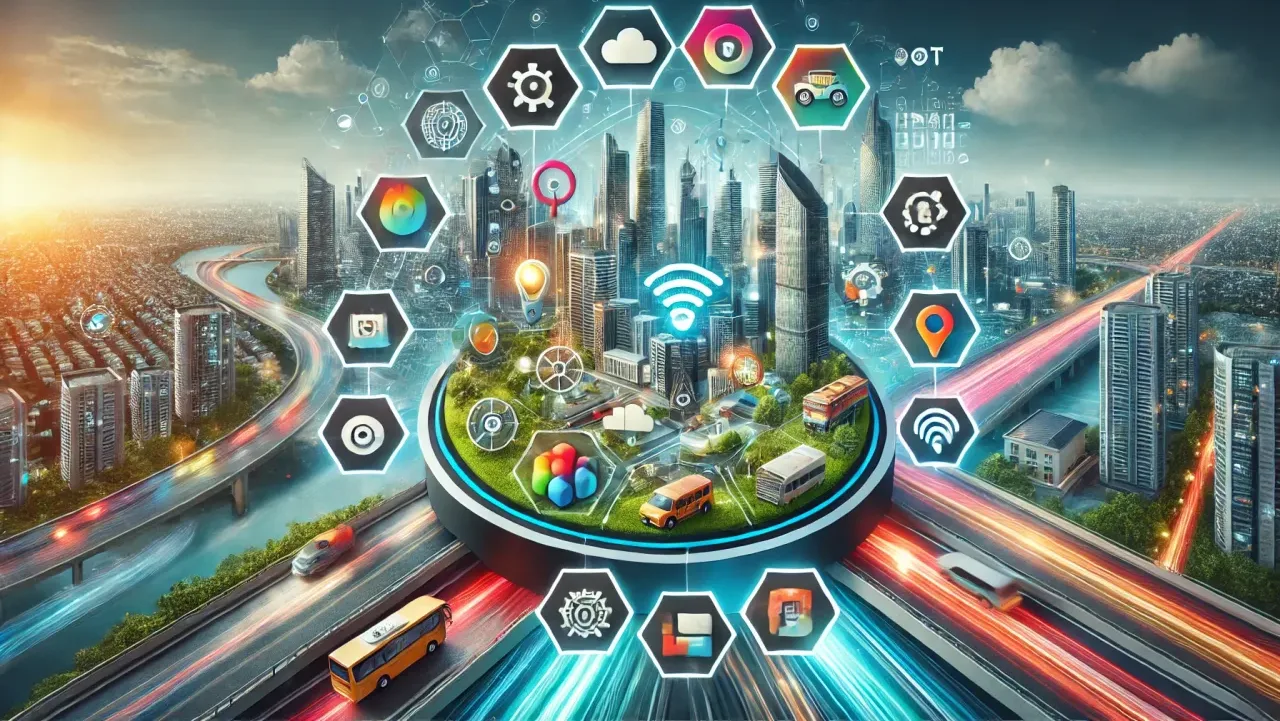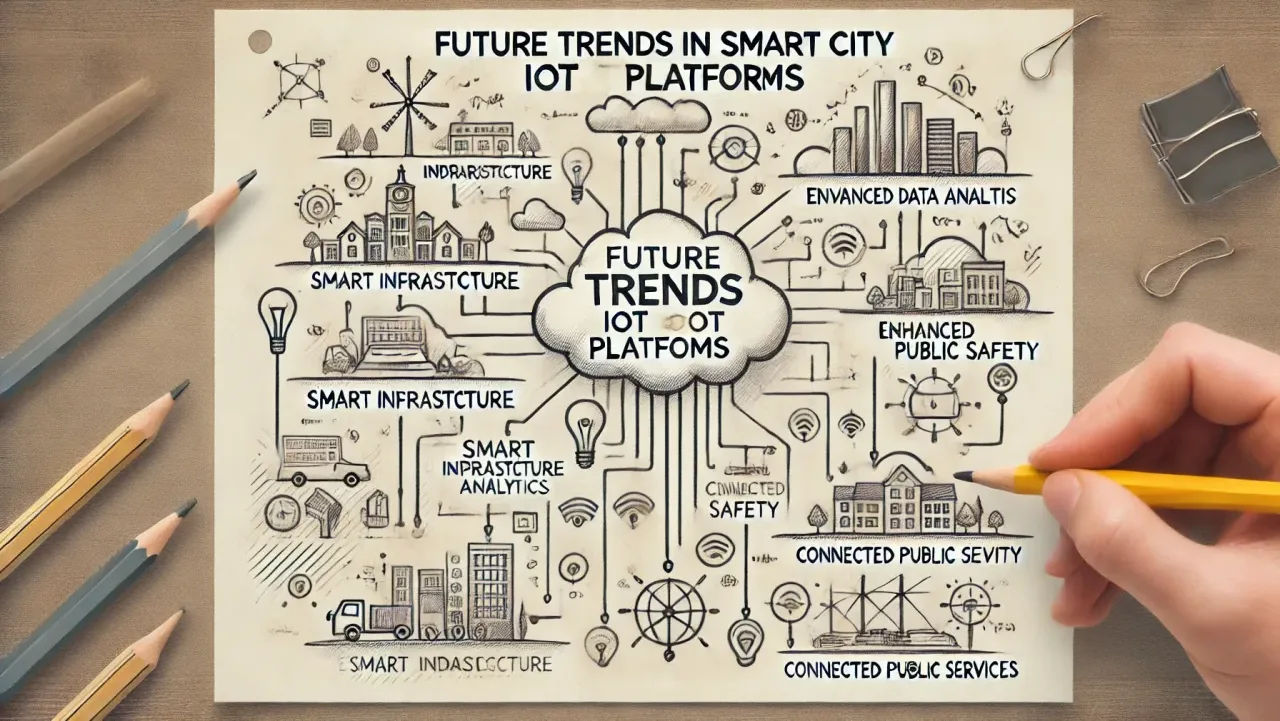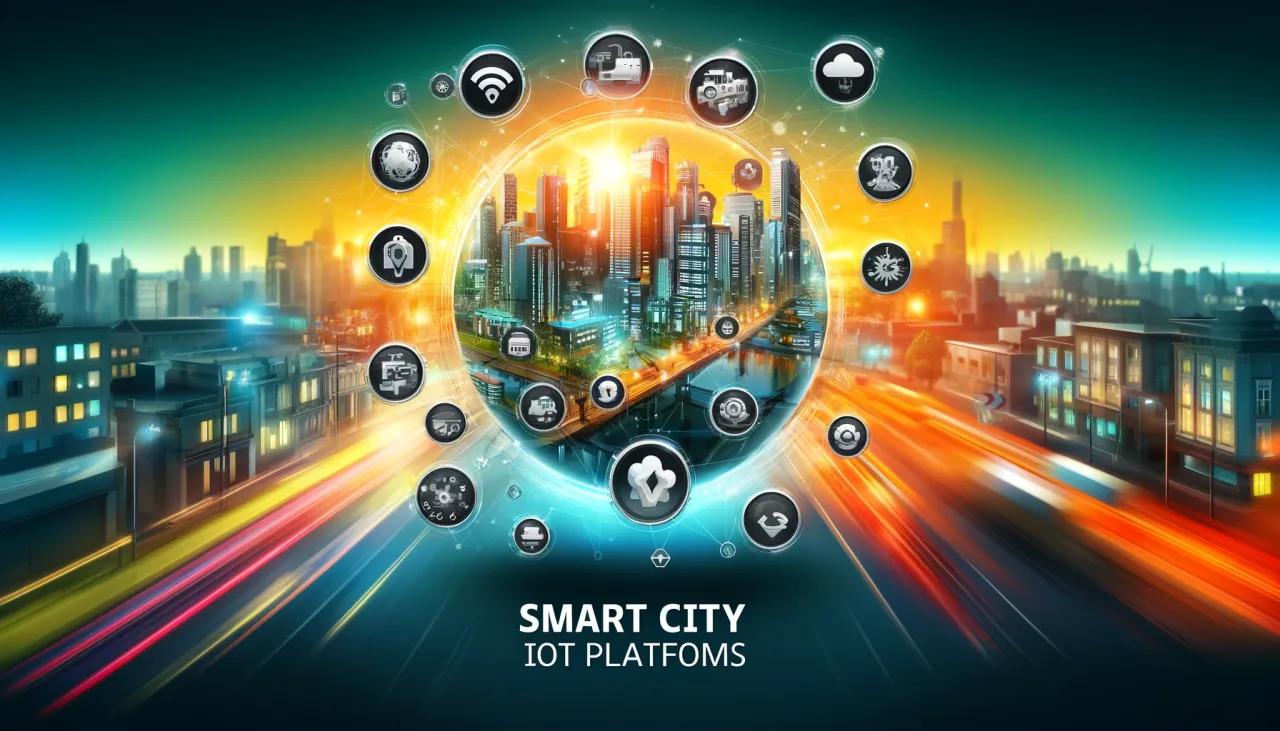In this Article
Introduction to Smart City IoT Platforms
The rise of smart cities is revolutionizing urban living, with IoT platforms playing a pivotal role in this transformation. These platforms provide the necessary infrastructure and tools to manage and optimize city operations, from traffic management to public safety. In this detailed article, we will explore the key features and benefits of smart city IoT platforms, highlighting how they enhance urban infrastructure and services.
What are Smart City IoT Platforms?
Definition
Smart city IoT platforms are integrated solutions that enable the collection, analysis, and management of data from various IoT devices deployed across urban areas. These platforms facilitate seamless communication between devices, systems, and city administrators, driving efficiency and innovation in city management.
Key Features of Smart City IoT Platforms
Connectivity and Communication
Smart city IoT platforms provide robust connectivity solutions, enabling seamless communication between devices and systems across the city.
- High Bandwidth: Supports high data transmission rates, essential for real-time monitoring and control.
- Low Latency: Ensures quick response times for critical applications like traffic management and emergency services.
- Multiple Protocols: Supports various communication protocols, ensuring compatibility with a wide range of devices.
Data Management and Analytics
Efficient data management and analytics are crucial for transforming raw data into actionable insights.
- Real-Time Data Processing: Enables immediate analysis of data for timely decision-making.
- Big Data Support: Handles large volumes of data generated by numerous IoT devices.
- Advanced Analytics: Utilizes machine learning and AI to provide predictive analytics and deeper insights.
Security and Privacy
Ensuring the security and privacy of data and devices is a top priority for smart city IoT platforms.
- Data Encryption: Protects data during transmission and storage.
- Device Authentication: Ensures that only authorized devices can connect to the network.
- Privacy Compliance: Adheres to regulatory standards for data privacy and security.
Scalability and Flexibility
Smart city IoT platforms are designed to scale and adapt to the growing and changing needs of urban environments.
- Modular Architecture: Allows for easy addition of new devices and services.
- Cloud Integration: Provides scalable storage and computing resources.
- Flexible Deployment: Supports both on-premise and cloud-based deployments.
Benefits of Smart City IoT Platforms
Improved Urban Mobility

Ai Image by Dall-E
Smart city IoT platforms enhance transportation systems, leading to more efficient and safer urban mobility.
- Traffic Management: Real-time traffic monitoring and adaptive signal control reduce congestion.
- Public Transportation: Smart scheduling and route optimization improve the efficiency of public transit systems.
- Parking Management: IoT-enabled parking solutions reduce the time spent searching for parking spots.
Enhanced Public Safety
IoT platforms play a critical role in improving public safety through various applications.
- Surveillance Systems: Smart cameras and sensors provide real-time monitoring and alerts.
- Emergency Response: IoT-enabled emergency systems ensure quick response to incidents.
- Disaster Management: Real-time data and predictive analytics help in disaster preparedness and response.
Efficient Resource Management
Smart city IoT platforms optimize the use of resources, leading to cost savings and sustainability.
- Energy Management: Real-time monitoring and control of energy usage reduce consumption and costs.
- Water Management: IoT solutions for leak detection and water quality monitoring ensure efficient water usage.
- Waste Management: Smart waste collection systems optimize routes and schedules, reducing operational costs.
Use Cases of Smart City IoT Platforms
Smart Lighting
Smart lighting solutions use IoT platforms to optimize street lighting based on real-time conditions.
- Energy Savings: Adjusts lighting based on traffic and weather conditions, reducing energy consumption.
- Remote Control: Allows for centralized management and control of street lighting systems.
- Maintenance Alerts: Provides alerts for maintenance needs, ensuring timely repairs.
Environmental Monitoring
IoT platforms enable continuous monitoring of environmental conditions, improving urban living standards.
- Air Quality Monitoring: Sensors track pollutants and provide real-time data to residents and authorities.
- Noise Monitoring: Detects and manages noise pollution in urban areas.
- Climate Control: Monitors and predicts weather patterns for better urban planning.
Smart Buildings
Smart buildings leverage IoT platforms to enhance building management and occupant comfort.
- Energy Efficiency: Automated systems for HVAC and lighting improve energy efficiency.
- Security Systems: Integrated security solutions provide real-time monitoring and access control.
- Occupant Comfort: Smart solutions adjust environmental settings based on occupant preferences and usage patterns.
Leading Smart City IoT Platforms
Cisco Kinetic for Cities
Cisco Kinetic for Cities is a leading IoT platform designed to enhance urban infrastructure and services.
- Real-Time Data Management: Collects and analyzes data from various city systems.
- Scalability: Supports the growing needs of smart cities with scalable solutions.
- Security: Offers robust security features to protect city data and infrastructure.
Siemens MindSphere
Siemens MindSphere provides a comprehensive IoT platform for smart city applications.
- Open Ecosystem: Supports a wide range of devices and communication protocols.
- Advanced Analytics: Provides powerful analytics tools for data-driven decision-making.
- Integration: Seamlessly integrates with existing city systems and infrastructure.
IBM Watson IoT for Smart Cities
IBM Watson IoT for Smart Cities leverages cognitive computing to enhance urban management.
- AI and Machine Learning: Utilizes AI to provide predictive analytics and insights.
- Connectivity: Ensures reliable and secure connectivity for city-wide IoT deployments.
- User-Friendly Interfaces: Offers intuitive dashboards for easy management and monitoring.
Microsoft Azure IoT Central
Microsoft Azure IoT Central is a highly flexible and scalable platform that supports smart city applications.
- Comprehensive Connectivity: Supports a wide range of devices and communication protocols.
- Robust Security: Provides advanced security features to protect data and devices.
- Data Integration: Seamlessly integrates with other Azure services for advanced analytics and machine learning.
Minnovation Smart City Platform
Minnovation provides a specialized IoT platform tailored for smart city applications.
- Custom Solutions: Tailored IoT solutions to fit specific urban needs.
- Robust Security: Advanced security features to protect data and devices.
- Scalable Architecture: Supports growing IoT networks for expanding cities.
Challenges and Considerations
Implementing smart city IoT platforms comes with its own set of challenges. Addressing these challenges is crucial for the successful deployment and operation of smart city solutions.
Data Privacy and Security
One of the biggest challenges in implementing smart city IoT platforms is ensuring data privacy and security. With the vast amounts of data collected, it is essential to have robust security measures in place to protect sensitive information.
- Encryption Standards: Implementing strong encryption standards to protect data.
- Access Control: Restricting access to authorized personnel only.
- Compliance: Ensuring compliance with data protection regulations and standards.
Infrastructure Costs
Building and maintaining the infrastructure for smart city IoT platforms can be costly. Cities need to plan and allocate budgets effectively to support the deployment and maintenance of IoT systems.
- Initial Investment: High initial costs for deploying IoT infrastructure.
- Maintenance Costs: Ongoing maintenance and upgrade costs.
- Cost-Benefit Analysis: Conducting thorough cost-benefit analysis to justify investments.
Interoperability
Ensuring interoperability between various IoT devices and platforms is crucial for the seamless operation of smart city solutions. Interoperability challenges can hinder the effective integration and functionality of IoT systems.
- Standardization: Adopting standardized communication protocols and data formats.
- Compatibility: Ensuring compatibility between different devices and platforms.
- Integration: Seamless integration with existing city infrastructure and systems.
Future Trends in Smart City IoT Platforms

Ai Image by Dall-E
As technology continues to evolve, smart city IoT platforms are expected to incorporate new trends and advancements. Keeping up with these trends will be essential for cities to remain competitive and innovative.
5G Connectivity
The rollout of 5G networks will significantly enhance the capabilities of smart city IoT platforms. With higher bandwidth and lower latency, 5G will enable more real-time applications and improve the overall performance of IoT systems.
- High-Speed Data Transfer: Faster data transfer speeds for real-time applications.
- Low Latency: Reduced latency for critical applications like emergency response.
- Increased Capacity: Support for more connected devices and higher data volumes.
Artificial Intelligence and Machine Learning
Integrating AI and machine learning with IoT platforms will provide cities with powerful tools for data analysis and decision-making. AI-driven insights can optimize city operations and enhance the quality of life for residents.
- Predictive Analytics: Using AI to predict and mitigate issues before they occur.
- Automated Decision-Making: AI-driven automation for improved efficiency.
- Enhanced Insights: Deeper insights from advanced data analysis.
Edge Computing
Edge computing involves processing data closer to the source, reducing the need for centralized data processing. This approach can enhance the performance and efficiency of smart city IoT platform.
- Reduced Latency: Faster data processing and response times.
- Improved Efficiency: Reduced bandwidth usage and lower data transfer costs.
- Enhanced Security: Keeping sensitive data closer to the source for better security.
Conclusion
Smart city IoT platforms are integral to the development of modern urban environments. By providing robust connectivity, efficient data management, and enhanced security, these platforms enable cities to improve infrastructure, optimize resources, and enhance the quality of life for residents. As technology continues to evolve, the adoption of smart city IoT platforms will become increasingly crucial for urban development.
How We Can Help
At Minnovation, we specialize in providing comprehensive IoT solutions tailored to meet the unique needs of your smart city projects. Our expertise in various IoT platforms ensures seamless integration, robust security, and enhanced performance. We offer consultation, development, and management services to help you harness the full potential of IoT technology. Whether you are looking to implement a new IoT system or optimize your existing infrastructure, our team is here to support you every step of the way. Contact us to learn more about how we can help you transform your city with cutting-edge IoT solutions.
Reference
Related Blog Posts
How Smart Cities Connect: Getting Started with Edge AI and IoT Technology
How to Get Started with Edge AI and IoT Technologies in Smart Cities: Overcoming Integration Challenges In recent years, the concept of smart cities has evolved from a futuristic Read More
5 Step Strategy: Ensuring Security and Privacy in 15-Minute Smart Cities
Introduction Ensuring security and privacy in 15-minute smart cities is a critical challenge as urban areas become increasingly connected through IoT and edge AI technologies. These cities aim to Read More
What is a smart city and the challenge of legacy systems
How to Get Started with Integrating Legacy Systems in Smart Cities Smart cities are transforming urban landscapes by leveraging technology to improve the quality of life for residents. However, Read More




